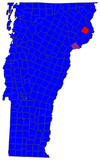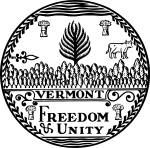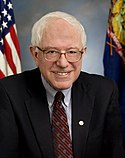2006 United States Senate election in Vermont
| |||||||||||||||||
| |||||||||||||||||
 Municipality Results | |||||||||||||||||
| |||||||||||||||||
| Elections in Vermont |
|---|
 |
The 2006 United States Senate election in Vermont was held on November 7, 2006. Incumbent Republican turned independent Senator Jim Jeffords decided to retire, and Bernie Sanders was elected to succeed him.
Sanders represented Vermont's at-large House district as an independent (one of very few in Congress), won the Democratic primary and then dropped out to run as an independent. Many Democratic politicians across the country endorsed Sanders, as no Democrat was on the ballot. The state committee of the Vermont Democratic Party voted unanimously to endorse Sanders.[1]
Sanders won the open seat with 65% of the vote.
Democratic primary
Candidates
Four candidates ran in the primary: Sanders and three little-known opponents.[2][3]
- Larry Drown, of Northfield Village, retired plumber, perennial candidate
- Peter D. Moss, of Fairfax
- Louis W. Thabault, of South Burlington, former postal worker
- Bernie Sanders of Burlington, U.S. Representative
Results
Sanders won the Democratic primary, but declined the nomination, leaving no Democratic nominee on the ballot. This victory ensured that no Democrat would appear on the general election ballot to split the vote with Sanders, an ally of the Democrats, who has been supported by leaders in the Democratic Party.
Republican primary
Candidates
- Cris Ericson
- Greg Parke
- Richard Tarrant, businessman
Results
Tarrant won.
General election
Candidates
- Pete Diamondstone (Liberty Union)
- Cris Ericson (I)
- Craig Hill (Green), of Montpelier, electronics marketer[4]
- Peter Moss (I)
- Bernie Sanders (I)
- Richard Tarrant (R)
Campaign
In mid-August 2006, the campaign heated up considerably, with Tarrant fully engaged in heavy media advertising, most of which criticized Sanders' public stances. Tarrant ran several ads accusing Sanders of representing himself differently from his voting record in the House of Representatives, citing such examples as Sanders' votes against Amber Alert and against increased penalties for child pornography. Sanders responded with an ad stating that Tarrant's claims are "dishonest" and "distort my record" and presented what he viewed as more accurate explanations of his voting record.
Endorsements
Since Sanders is allied with the Democrats in the House of Representatives, Democratic leadership successfully dissuaded any serious challengers from their party. Sanders was endorsed by prominent Democrats such as DNC Chairman and former Vermont Governor Howard Dean, Senate Minority Leader Harry Reid, and Senator Chuck Schumer of New York, the chairman of the Democratic Senatorial Campaign Committee. On February 13, 2005 Sanders received an endorsement from Democracy for America, the political action committee that was founded by Dean after he withdrew from the 2004 Presidential race.[5]
Fundraising
The election was the most expensive political campaign in Vermont history.[6]
Tarrant was a self-funded candidate, with 98% of all his campaign expenditures coming from personal sources. He spent $7,315,854 total.[7] Sanders' top contributors include the plaintiffs' law firm Baron & Budd; the International Union of Operating Engineers; the Laborers' International Union of North America; and the Communication Workers of America. Sanders raised $5,554,466 total.[8] In total, Tarrant and Sanders spent $13,771,060.[7] Tarrant spent $85 per vote, the largest cost per vote of any race in the country during 2006, while Sanders spent $34 per vote.[9]
Polling
| Source | Date | Sanders (DS) | Tarrant (R) |
|---|---|---|---|
| Research 2000 | October 23–24, 2006 | 57% | 36% |
| Research 2000 | September 18–19, 2006 | 58% | 33% |
| American Research Group | September 15, 2006 | 55% | 40% |
| Rasmussen | August 3, 2006 | 62% | 34% |
| American Research Group | July 27, 2006 | 56% | 35% |
| Rasmussen | June 16, 2006 | 67% | 29% |
| Research 2000 | May 11, 2006 | 61% | 24% |
| Doyle Poll | March 7, 2006 | 62% | 26% |
| Rasmussen | January 5, 2006 | 70% | 25% |
| Research 2000 | November 1, 2005 | 64% | 16% |
Results
Official results from the Vermont United States Senate
[1]:
| Party | Candidate | Votes | % | ±% | |
|---|---|---|---|---|---|
| Independent | Bernie Sanders | 171,638 | 65.4 | n/a | |
| Republican | Richard Tarrant | 84,924 | 32.3 | -33.2 | |
| Independent | Cris Ericson | 1,735 | 0.6 | n/a | |
| Green | Craig Hill | 1,536 | 0.5 | n/a | |
| Independent | Peter D. Moss | 1,518 | 0.5 | n/a | |
| Liberty Union | Peter Diamondstone | 801 | 0.3 | -0.2 | |
| Write-ins | 267 | 0.1 | 0 | ||
| Majority | 86,741 | 33.1 | |||
| Turnout | 262,419 | ||||
| Independent hold | Swing | ||||
Sanders won a majority of the votes in every county in the state, with 57% as his lowest county total.
See also
- United States Senate elections, 2006
- Vermont United States House of Representatives election, 2006
- Vermont gubernatorial election, 2006
External links
- Vermont Secretary of State's Draft list of candidates (Excel spreadsheet). (Final version due to be released on July 24, 2006).
References
- ^ Democratic primary is far from ordinary (September 11, 2006). Barre-Montpelier Times-Argus.
- ^ Democratic primary is far from ordinary (September 11, 2006). Barre-Montpelier Times-Argus.
- ^ M.D. Drysdale, Primary Election Is Next Tuesday (September 7, 2009). Herald.
- ^ Democratic primary is far from ordinary (September 11, 2006). Barre-Montpelier Times-Argus.
- ^ "DFA Backs Sanders and Welch". WCAX. 2006-02-13. Retrieved 2007-02-03.
- ^ Wilson Ring, Sanders, Welch win in Vermont races (November 8, 2006). Associated Press.
- ^ a b "Congressional Races - 2006 Vermont Senate". Opensecrets.org. Center for Responsive Politics. 2007-02-02. Retrieved 2007-02-03.
- ^ "Vermont Senate: 2006 Race Profile - Top Contributors". Opensecrets.org. Center for Responsive Politics. 2006-12-11. Retrieved 2007-02-03.
- ^ Ottenhoff, Patrick (2007-01-31). "What's the value of a vote". MSNBC.
| Preceded by 2004 Patrick Leahy (D) |
Vermont U.S. Senate elections 2006 Bernie Sanders (I) |
Succeeded by 2010 Patrick Leahy (D) |


